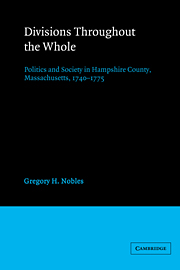Book contents
- Frontmatter
- Contents
- Preface
- Introduction
- 1 Family power and political relations in Hampshire County
- 2 The Hampshire County ministry and the Great Awakening: from revival to reaction
- 3 The revivalist removed
- 4 The legacy of religious dissent
- 5 New settlements in an unsettled society
- 6 The politics of parochialism
- 7 Revolution in the neighborhood
- Appendix
- Notes
- Bibliographical essay
- Index
7 - Revolution in the neighborhood
Published online by Cambridge University Press: 30 September 2009
- Frontmatter
- Contents
- Preface
- Introduction
- 1 Family power and political relations in Hampshire County
- 2 The Hampshire County ministry and the Great Awakening: from revival to reaction
- 3 The revivalist removed
- 4 The legacy of religious dissent
- 5 New settlements in an unsettled society
- 6 The politics of parochialism
- 7 Revolution in the neighborhood
- Appendix
- Notes
- Bibliographical essay
- Index
Summary
The people of Hampshire County were hardly in the forefront of the Revolutionary movement. For almost a generation they had been too embroiled in their own local affairs–too worried, for instance, about the state of their religion, the boundaries of their towns, the location of their meetinghouses–to pay much attention to the growing crisis in Boston. It was only through the repeated efforts of the urban radicals on the Boston Committee of Correspondence that the majority of people in Hampshire County were awakened to the larger colonial issues. Even so, that awakening came relatively late, generally not until 1774.
But when the westerners did enter the Revolution, their political attitudes were not simply the creation of the Boston Whigs. The parochial disputes that had so engrossed the inhabitants of Hampshire County during the previous thirty years had their own political meaning and importance. On one level many people had gained experience as political actors, organizing and mobilizing themselves into groups to pursue a particular local issue. Moreover, in defining those issues, many people had gained a clearer and more immediate sense of the fundamental political values, independence and self-government, for instance, that underlay the Revolutionary movement. In that sense local politics helped create the basis for a popular response to the politics of the larger colonial struggle.
At the same time the larger struggle had its effect on local politics.
- Type
- Chapter
- Information
- Divisions throughout the WholePolitics and Society in Hampshire County, Massachusetts, 1740–1775, pp. 155 - 188Publisher: Cambridge University PressPrint publication year: 1983



